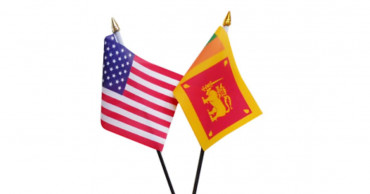civil war
South Sudan teetering on the edge of renewed civil war, UN envoy says
South Sudan is teetering on the edge of renewed civil war, the top UN official in the world’s youngest nation warned on Monday, lamenting the government’s sudden postponement of the latest peace effort.
Calling the situation unfolding in the country “dire,” Nicholas Haysom said international efforts to broker a peaceful solution can only succeed if President Salva Kiir and his rival-turned-vice president, Riek Machar, are willing to engage “and put the interests of their people ahead of their own.”
There were high hopes when oil-rich South Sudan gained independence from Sudan in 2011 after a long conflict. But the country slid into a civil war in December 2013 largely based on ethnic divisions when forces loyal to Kiir, an ethnic Dinka, battled those loyal to Machar, an ethnic Nuer.
More than 400,000 people were killed in the war, which ended with a 2018 peace agreement that brought Kiir and Machar together in a government of national unity. Under the agreement, elections were supposed to be held in February 2023, but they were postponed until December 2024 — and again until 2026.
The latest tensions stem from fighting in the country’s north between government troops and a rebel militia, known as the White Army, which is widely believed to be allied with Machar.
South Africa president denies white persecution
Earlier this month, a South Sudanese general was among several people killed when a United Nations helicopter on a mission to evacuate government troops from the town of Nasir, the scene of the fighting in Upper Nile state, came under fire. Days earlier on March 4, the White Army overran the military garrison in Nasir and government troops responded by surrounding Machar’s home in the capital, Juba, and arresting several of his key allies.
Haysom said tensions and violence were escalating “particularly as we grow closer to elections and as political competition increases, sharpens between the principal players.”
He said Kiir and Machar don’t trust each other enough to display the leadership needed to implement the 2018 peace deal and move to a future that would see a stable and democratic South Sudan.
“Rampant misinformation, disinformation and hate speech is also ratcheting up tensions and driving ethnic divisions, and fear,” Haysom said.
“Given this grim situation,” he said, “we are left with no other conclusion but to assess that South Sudan is teetering on the edge of a relapse into civil war.”
Haysom, who heads the nearly 18,000-member U.N. peacekeeping mission in South Sudan, warned that a relapse into open war would lead to the same horrors that ravaged the country, especially in 2013 and 2016.
He said the UN takes the threat of the “ethnic transformation” of the conflict very seriously.
To try to prevent a new civil war, the UN special envoy said the peacekeeping mission is engaging in intense shuttle diplomacy with international and regional partners, including the African Union.
Haysom said the collective message of the regional and international community is for Kiir and Machar to meet to resolve their differences, return to the 2018 peace deal, adhere to the ceasefire, release detained officials and resolve tensions “through dialogue rather than military confrontation.”
11 months ago
FBI records deepen mystery of dig for Civil War-era gold
The court-ordered release of a trove of government photos, videos, maps and other documents involving the FBI's secretive search for Civil War-era gold has a treasure hunter more convinced than ever of a coverup — and just as determined to prove it.
Dennis Parada waged a legal battle to force the FBI to turn over records of its excavation in Dents Run, Pennsylvania, where local lore says an 1863 shipment of Union gold disappeared on its way to the U.S. Mint in Philadelphia. The FBI, which went to Dents Run after sophisticated testing suggested tons of gold might be buried there, has long insisted the dig came up empty.
Parada and his advisers, who have spent countless hours poring over the newly released government records, believe otherwise. They accuse the FBI of distorting key evidence and improperly withholding records in an apparent effort to conceal the recovery of a historic, extremely valuable gold cache. The FBI defends its handling of the materials.
Parada's dispute with the FBI is playing out in federal court, where a judge overseeing the case must decide whether the FBI will have to release its operational plan for the gold dig and other records it wants to keep secret. The judge could also order the FBI to keep looking for additional materials to turn over to the treasure hunter.
“We feel we were double-crossed and lied to,” Parada said in an interview at his cramped, wood-paneled office, where huge drill bits and high-end metal detectors compete for space with rusty miners' picks, Civil War-era cannon parts and other odds and ends he's dug up over the years.
“The truth will come out,” said Parada, co-founder of the treasure-hunting outfit Finders Keepers. Solving the mystery is not his only goal — he had hoped to earn a finder’s fee from the potential recovery of hundreds of millions of dollars worth of gold.
An FBI spokesperson declined to answer questions about the agency’s gold dig records or respond to the coverup allegations, citing the ongoing litigation. Last year, the FBI released a statement publicly acknowledging for the first time that it had been looking for gold in Dents Run. The statement said the FBI did not find any, adding the agency “continues to unequivocally reject any claims or speculation to the contrary.”
There is little evidence in the historical record to suggest that an Army detachment lost a gold shipment in the Pennsylvania wilderness — possibly the result of an ambush by Confederate sympathizers — but the legend has inspired generations of treasure hunters, Parada among them.
He and his son spent years looking for the fabled gold of Dents Run, eventually guiding the FBI to a remote woodland site 135 miles (220 kilometers) northeast of Pittsburgh where they say their instruments identified a large quantity of metal. The FBI brought in a geophysical consulting firm whose sensitive equipment detected a 7- to 9-ton mass suggestive of gold.
Armed with a warrant, a team of FBI agents came in March 2018 to dig up the hillside. An FBI videographer was on hand to document it, at one point interviewing a Philadelphia-based agent on the FBI’s art-crime team who explained why the FBI was in the woods of one of Pennsylvania's most sparsely populated counties.
“We’ve identified through our investigation a site that we believe has U.S. property, which includes a significant sum of base metal which is valuable ... particularly gold, maybe silver,” the agent said on the video, his face blurred by the FBI to protect his privacy.
Calling it a “155-year-old cold case,” he said the FBI had corroborated Parada’s information about the location of the reputed gold through "scientific testing." He stressed the test results did not prove the presence of gold. Only a dig would help law enforcement “get to the bottom of this story once and for all,” the agent said.
Parada obtained the video and other FBI records through a Freedom of Information Act lawsuit, hoping they would help answer lingering questions about what took place at Dents Run five years ago. Parada was mostly kept away from the dig site while the FBI did its work.
He suspects the agency conducted a clandestine, overnight dig between the first and second days of the court-authorized excavation, found the gold, and spirited it away. Residents have previously told of hearing a backhoe and jackhammer overnight — when the dig was supposed to have been paused — and seeing a convoy of FBI vehicles, including large armored trucks. The FBI has denied it conducted an overnight dig.
Parada and a consultant, Warren Getler, have focused on a handful of FBI photos and an accompanying photo log that have them questioning the FBI's official gold dig timeline. At issue is the presence or absence of snow in the images and the timing of a storm that briefly disrupted operations. For example, an FBI image that was supposed to have been taken about an hour after the squall does not show any snow on a large, moss-covered boulder at the dig site. That same boulder is snow-covered in a photo that FBI records indicate was taken the next morning — some 15 hours after the storm.
They accuse the FBI of altering the sequence of events to conceal an overnight excavation.
“We have compelling evidence a night dig took place, and that the FBI went to some large effort to cover up that night dig,” said Getler, co-author of “Rebel Gold,” a book exploring the possibility of buried Civil War-era caches of gold and silver.
There are other seeming anomalies in the records, according to Finders Keepers' legal motion. Among them:
— The FBI initially turned over hundreds of photos, but rendered them in low-resolution, high-contrast black-and-white, making it impossible to tell the time of day they were taken or even, in some cases, what they show. The treasure hunters went back and requested several dozen of the photos in color, which the FBI provided.
— The agency did not provide any video of the second and final day of the dig. Nor did it produce any photos or video showing what the FBI’s own hand-drawn map described as a 30-foot-long, 12-foot-deep trench — which the treasure hunters claim could have only been dug overnight. Government lawyers acknowledged these gaps in the photo and video record but did not elaborate in a court filing last week.
— The consulting firm hired by the FBI to assess the possibility of gold produced a report on its findings, but the version given to the treasure hunters seems to be missing key pages.
— The FBI did not provide any of its agents' travel and expense invoices, which could shed further light on the dig timeline.
The records released so far “cast doubt on the FBI’s claim to have found nothing and raise serious and troubling questions about the FBI’s conduct during the dig and in this litigation, where it has gone to great lengths to distort critical evidence,” Anne Weismann, a lawyer for Finders Keepers, wrote in a legal filing that seeks records, including the FBI’s operational plan, that she says were improperly withheld.
The Justice Department did not address the treasure hunters’ most explosive claims of a possible coverup in its latest legal filing. The government instead told a federal judge in Washington, D.C., that the FBI had satisfied its legal obligation to the treasure hunters to search for its records of the dig, and asked for the case to be closed.
The judge has yet to rule.
Parada said he will keep asking questions until he gets satisfactory answers.
“I will stick at this until the end, until I know everything that happened to that gold,” he said. “How much, where it went to, who has it now. I gotta know.”
3 years ago
Yemen’s president steps aside amid efforts to end war
Yemen’s exiled president stepped aside and transferred his powers to a presidential council on Thursday, as international and regional efforts to end the country’s long-running civil war gained momentum with a two-month truce.
Saudi Arabia and the United Arab Emirates, major players in the conflict appear to have played a role in President Abed Rabbo Mansour Hadi's decision, quickly welcoming it with a pledge of $3 billion in aid. The head of the new council has close ties to Riyadh.
Whether the switch will expedite an end to the grinding war remains to be seen, as U.N.-sponsored negotiations have been at an impasse and fighting, airstrikes and missile attacks continued until late last month. The Houthis did not immediately comment on Hadi's announcement.
Also read: Yemen rebels strike oil depot in Saudi city hosting F1 race
Peter Salisbury, Yemen expert at the International Crisis Group, described the power transfer as “A Big Deal.” The development, he tweeted, is the “most consequential shift in the inner workings of the anti-Houthi bloc since war began.”
Hadi, 76, said the newly established council will run the internationally recognized government and lead negotiations with the Iranian-backed Houthis, according to a statement aired on state-run media.
The move is meant to unify the anti-Houthi camp after years of infighting and disputes, and was almost certainly orchestrated in Riyadh, where Yemeni factions were meeting over the past week to discuss efforts to end the war.
“With this declaration a Presidential Leadership Council shall be established to complete the implementation of the tasks of the transitional period. I irreversibly delegate to the Presidential Leadership Council my full powers,” Hadi declared on Yemen’s state-run TV.
Hadi also sacked Vice President Ali Mohsen al-Ahmar, a powerful military figure, and also delegated al-Ahmar’s powers to the presidential council.
The presidential council is chaired by Rashad al-Alimi, an advisor to Hadi and former interior minister with the government of late strongman President Ali Abdullah Saleh.
Al-Alimi enjoys close ties with Saudi Arabia and other political groups inside Yemen, including the powerful Islah party — the transnational Muslim Brotherhood’s branch in Yemen.
The council has seven other members, all whom have political and military influence on the ground in Yemen. That includes Aydarous al-Zubaidi, head of the secessionist Southern Transitional Council — an umbrella group of heavily armed and well-financed militias propped up by the UAE since 2015.
Sheikh Sultan al-Aradah, the powerful governor of energy-rich Marib province, was also named a member of the council. So was Tariq Saleh, a militia leader and nephew of the late president who has close ties with the UAE.
Hadi was named president of Yemen in 2012 with a mission to oversee a democratic transition following its Arab Spring uprising that ended Saleh's longtime rule.
However, the Houthis, a religious movement turned rebel militia, allied with Saleh and seized the capital Sanaa in 2014, forcing Hadi and his government into exile in Saudi Arabia.
Months later, Saudi Arabia formed a military coalition and entered the war to try to restore Hadi’s government to power.
The conflict has in recent years become a regional proxy war that has killed more than 150,000 people, including over 14.500 civilians. It has also created one of the worst humanitarian crises in the world.
Welcoming Hadi's move, Saudi Arabia urged the presidential council to embark on U.N.-led negotiations with the Houthis to find a “political, final and comprehensive” settlement to the conflict, according to the state-run Saudi Press Agency.
Powerful Saudi Crown Prince Mohammed bin Salman has also met with the council head and its members, according to Saudi state-run TV.
Also read:UAE intercepts Yemen missile as Israeli president visits
The warring sides announced a two-month cease-fire earlier this month, the first nationwide truce in Yemen in six years.
Hadi’s announcement came as Yemeni talks called by the Saudi-based Gulf Cooperation Council entered their final day on Thursday. The Houthis boycotted the GCC-facilitated efforts because they're taking place in Saudi Arabia, their adversary’s territory.
Jordan's Ministry of Foreign Affairs and Expatriates issued a statement welcoming Hadi's decision and hailing the aid package pledged by Saudi Arabia and the UAE.
3 years ago
'People are starving': New exodus in Ethiopia's Tigray area
Skinny, hungry, fleeing threats of violence, thousands of people who have been hiding in rural areas of Ethiopia’s Tigray region have begun arriving in a community that can barely support them — and more are said to be on the way.
4 years ago
Some in the GOP parrot far-right talk of a coming civil war
War-like imagery has begun spreading in Republican circles after the attack on the U.S. Capitol by a mob of President Donald Trump’s supporters, with some elected officials and party leaders rejecting pleas to tone down rhetoric calling for a second civil war.
5 years ago
Why Ethiopia is suddenly on brink of civil war
Suddenly Ethiopia appears on the brink of civil war, threatening the stability of one of the world’s most strategic regions, the Horn of Africa, and the fracturing of one of Africa’s most powerful and populous countries.
5 years ago
Sri Lanka asks US to review travel ban on its army chief
Sri Lanka asked the United States on Sunday to review its decision to impose a travel ban on the island nation's army chief, who has been accused of grave human rights abuses during the final stage of the country's civil war that ended 11 years ago.
6 years ago




.jpg)
.jpg)




